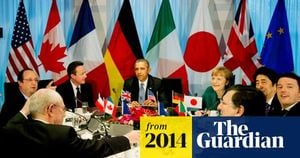International pressure is mounting against Rwanda as the United States and the European Union take strong actions over allegations of its support for the M23 rebel group, which has escalated violence and instigated widespread humanitarian crises within the eastern region of the Democratic Republic of the Congo (DRC).
According to Judith Suminwa Tuluka, the Prime Minister of the DRC, more than 7,000 Congolese, many of whom are civilians, have lost their lives since January amid increasing conflict exacerbated by Rwandan involvement. "Identifying all these victims is not easy, yet it is misleading to classify the casualties merely as military losses," she stated during a press briefing at the Human Rights Council in Geneva.
Highlighting the severe situation, Kaja Kallas, the EU’s High Representative, asserted, "We are on the brink of regional conflict. The territorial integrity of both Congo and Ukraine is non-negotiable." Following these declarations, the EU announced its decision to implement sanctions against Rwanda, effectively suspending initial defense consultations and reassessing previously established agreements concerning the supply of strategic minerals.
The proposed sanctions come on the heels of reports from United Nations experts asserting the presence of over 4,000 Rwandan soldiers supporting the M23, sparking significant international concern. The M23 has rapidly gained control over substantial territories within the DRC, including key cities such as Goma and Bukavu, leading to mass displacement and exacerbated humanitarian conditions.
With the EU highlighting the need for diplomatic resolutions and the cessation of Rwandan troop engagements, Kallas emphasized the necessity for Rwanda to withdraw its forces immediately from DRC territories. This strategy, deemed pivotal according to EU policy discussions, aims to de-escalate tensions and restore stability.
On February 21, global powers demonstrated their disapproval of Rwanda’s involvement by tying sanctions to figures like James Kabarebe, Rwanda’s Minister of Regional Integration, as well as M23 spokesperson Lawrence Kanyuka Kingston. This move sent ripples through Rwanda's political corridors, where accusations have surged concerning the government’s role as both instigator and benefactor of the conflict.
Amidst these developments, the European Parliament bolstered the call for action by overwhelmingly voting for the suspension of the EU-Rwanda memorandum concerning the trade of strategic minerals. The agreement, which came to fruition last year, involved Rwanda capitalizing on its rich mineral reserves, which include tungsten, gold, and rare earth elements—essential inputs for global technology supply chains.
Political analysts link the current M23 conflict with historical grievances stemming from the 1994 Rwandan Genocide, which reshaped regional dynamics and residual ethnic tensions. The DRC has long been viewed as both victim and battlefield, with its minerals often acting as both crutch and catalyst for conflict.
The situation remains precarious and multi-faceted, underscoring the long-standing enmities born out of colonial legacies, aiding the sustenance of militant groups like the M23. They are predominantly composed of Tutsi fighters, reflecting the deep ethnic divide present since the past conflicts.
EU foreign ministers have been actively contemplating sanctions, with Kallas reinforcing, “We have urged Rwanda to withdraw its troops, stressing the importance of recalibrated agreements surrounding its significant mineral exports, all under the scrutiny of international policy.”
The urgency for accountability is fueled by civil society's outcry for justice and transparency. Local NGOs have urged the international community to re-evaluate its engagement with Rwanda, recognizing the complicity of its government as conflict perpetuators.
On March 5, the UN Security Council reached historic consensus, passing resolutions directly condemning Rwanda’s support for M23 and calling for unconditional troop withdrawals. This marks a pivotal shift as the global community acknowledges Rwanda's role as not just a participant, but as instigator of violence.
US Secretary of State Marco Rubio also added weight to the call for immediate ceasefire negotiations to prevent worsening conditions. His remarks emphasized the urgency for diplomacy over conflict, expressing hope for resolution through international mediation.
Domestically, President Felix Tshisekedi has been vocal about fostering national unity to combat external threats, marking the formation of cohesive governance aimed at re-establishing sovereignty and stability. His administration has faced substantial criticism, and now seeks to overlook historic grievances to unite against the current threats posed by M23 and its Rwandan allies.
The backdrop of this heightened diplomatic engagement echoes centuries of turmoil, with minerals acting as both resource and source of contention. The tense situation has led observers to question the efficacy of the EU's 900 million euro investment plan through the Global Gateway initiative, aimed at supporting Rwanda's economic resilience.
Yet, as the international community embarks on this path of sanctions, the most pressing question remains: can diplomacy outmaneuver decades of entrenched conflict rooted deep within the DRC?



